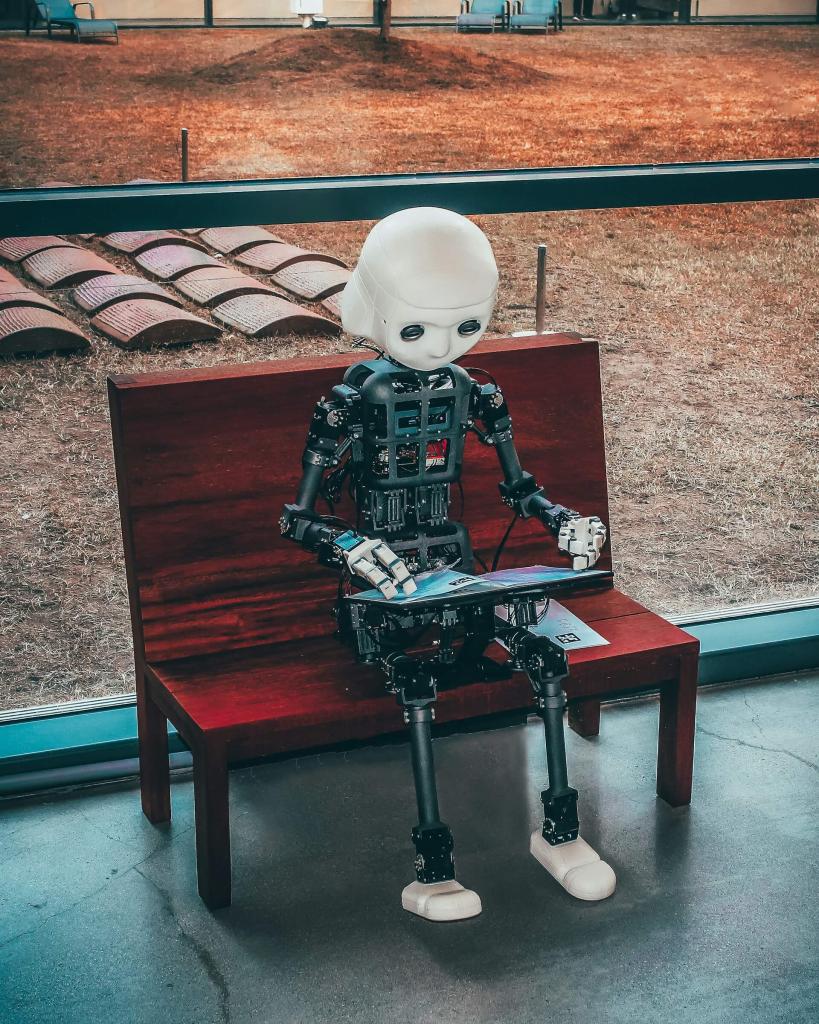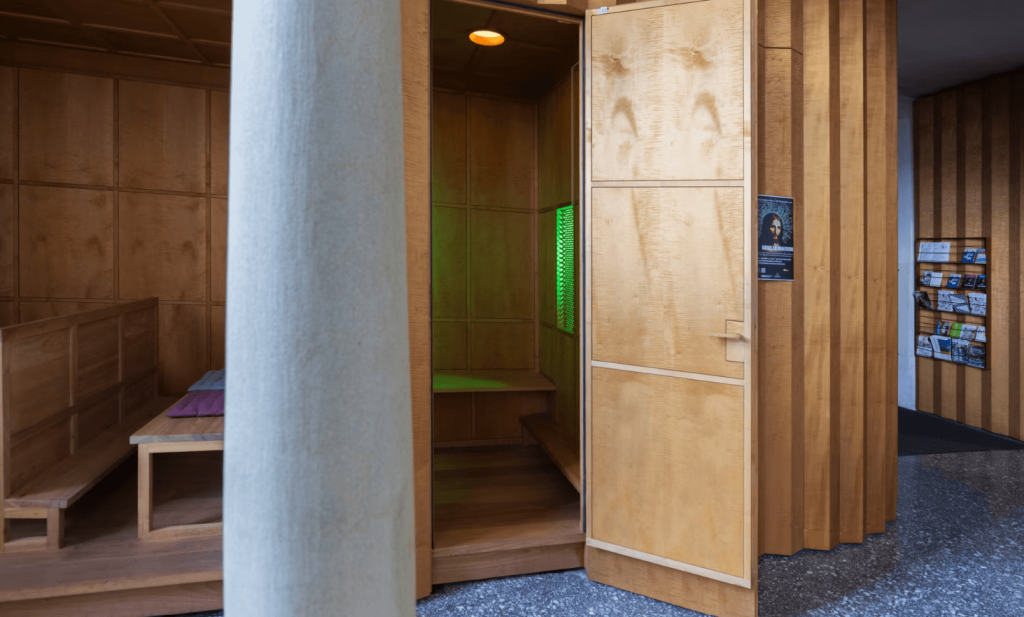You read that correctly: AI-powered Jesus. Artificial intelligence has opened pathways to lessened stress and lazy work for many. The software platform Open AI pioneered how machine learning can help develop creative projects such as artwork, spreadsheets, and writing.
It was only a matter of time, but now believers are subject to people mailing it in and not doing their job. Welcome to St. Peter’s Church in Lucerne, Switzerland. In a city of 82,000, you wouldn’t think a priest in a small community church would be that busy. Furthermore, with a church built in the 12th century, you wouldn’t think that this priest would be too concerned about being progressive and a need to offer current technology.
Surprise. St. Peter’s installed an AI-powered Jesus hologram. It accompanies an art project called “Deus in Machina,” loosely translated as “God in a Machine.”
EDITORS NOTE: Shout out to the Christian science fiction nerds who understood the headline. For those not in the know, “X” in Greek means “Christ,” and there was a cutting-edge movie entitled “Ex-Machina.” Moving on…
What is it really, and how can this help Christians in a tucked-away city in Switzerland? See for yourself.
Before we delve into this question, do you want to stay in touch with the faith-based issues that hit close to home? Subscribe to our free newsletter and never miss what’s being said about the Church and what Christians can say back.
Plug and Play for Prayer?

How can AI possibly respond to prayer in a church? Situations are specific, prayers are personal, and our relationship with Jesus should be completely personal. Yet, as with anything, when times are tough, people look for shortcuts. Maybe that’s why St. Peter’s in Switzerland plugged in this pious computer program. Much as those who practice Catholicism are familiar, parishioners enter a confessional booth, voice their concerns, and await the digital deity to scrape the Internet to give them an answer.
The interaction with the hologram AI-powered Jesus triggers the chatbot’s searches, which reach interested churchgoers looking for answers to personal petitions. The art installation is part of a greater exhibit illustrating how we leverage technology. The Daily Mail (UK) shares that “the AI was built by computer scientists and theologians from the Lucerne University of Applied Sciences and Arts and was trained on the New Testament and religious information found online.”
AI-powered Jesus speaks over 100 languages and provides answers related to Biblical inquiries.

“It was really an experiment,” said Marco Schmid, a theologian with the Peterskapelle church. “We wanted to see and understand how people react to an AI Jesus. What would they talk with him about? Would there be interest in talking to him? We’re probably pioneers in this.”
Although AI-powered Jesus is not providing the sacrament in the confessional, his face is featured behind the grate, familiar with those seated inside speaking about their sins, looking for forgiveness and penance. According to reports, people can enter the “Exhibit” and are greeted with an introduction from the Android Son of God.
“Do not disclose personal information under any circumstances, use this service at your own risk, press the button if you accept.”
If they press the button, theologians’ work—and that of the Applied Sciences and Arts College of Lucerne University—takes over. From the moment the churchgoer pauses and addresses their question, the bot searches the New Testament, commentary, and religious periodicals on any range of subjects. The Daily Mail reports that many people have labeled it a “gimmick” and suggest the holy chatbot only provides “generic” counsel. One recorded confessional, which goes against the penitent standards, went like this:
“How do I support, from a Christian perspective, an elderly, sick person who has decided on assisted suicide?”
“Perhaps you could ask your loved one the following questions…What does your faith mean to you in this difficult time?” AI Jesus responded. “Is there anything else in life that could bring you peace or joy? How can I support you and give you comfort?”
And then, chatbot Christ said, “Your task is not to judge, but to accompany with love.”
The counsel is more self-help and less sanctified, but it provides some peace to someone riddled with stress based on their query. The goal of this exhibit was to spark discussions on the role of AI in religion. Is there a role? Should we investigate AI first?
Are You Not Entertained?

Artificial Intelligence is a good tool, even in the Church. Yet, if someone is desperate for some free time, AI will execute someone’s job who didn’t want to invest the personal time. It can improve communication and enhance outreach. Yet, there must be human context to personalize what a computer program spits out.
Last September, we wrote about a pastor in Austin, Texas. His idea was an entire church experience with AI–that’s worship, Word, and a warm goodbye. AI replaces tasks, not humanity. Computers don’t empathize and hear from God, people do. When God’s people ask AI to offer spiritual advice, it should be a definite understanding that “spiritual” is the last thing a computer offers.
AI-powered Jesus, or whatever else, could assist a pastor with recommendations about making a more efficient worship service, stylized announcements on the projection screens (if that’s still a thing), or even references to share about a particular topic. Yet, people require human interaction. God’s Word is deeply personal, so a church service should be no less.
The positive side of AI in the Church includes theological connections, historical research, and inclusive ideas for all believers. However, there is a negative side to AI’s proliferation inside the pulpit. Those red flags could include:
- Reduce human interaction
- Removes emotional content
- Increases dependence on technology and not the Bible
- Creates privacy concerns and opens doors to data breaches
Maybe one other concern is cost. Technology is not cheap, and if pastors invest in AI to do their jobs, what will happen to ministry costs, community outreaches, or even overhead for employees? People in the creative department are probably sweating this news in fear of their employment. And is anyone concerned about the ethics of relying on a computer to help us navigate the mysteries of the Gospel?
Pastors should consider tools like Bible.ai, Church.tech, and TurboScribe. They help provide more accurate deliveries and better exegesis of certain topics. But ask yourself this: If Jesus didn’t place such a high priority on human relationships, why didn’t He walk the sands of the Middle East alone? As the gospel hymn goes, “Because He loves us.”
And let us consider how we may spur one another on toward love and good deeds, not giving up meeting together, as some are in the habit of doing, but encouraging one another—and all the more as you see the Day approaching. (Hebrews 10:24-25 NIV)
Dear friends, let us love one another, for love comes from God. Everyone who loves has been born of God and knows God. (1 John 4:7 NIV)
Paul knew that, as we read in one of his epistles.
God didn’t set us up for an angry rejection but for salvation by our Master, Jesus Christ. He died for us, a death that triggered life. Whether we’re awake with the living or asleep with the dead, we’re alive with him! So speak encouraging words to one another. Build up hope so you’ll all be together in this, no one left out, no one left behind. I know you’re already doing this; just keep on doing it. (1 Thessalonians 5:9-11 MSG)
Christianity and faith in Jesus demands a human element. We need each other to learn, to live, and to love. AI can’t do that. Maybe we shouldn’t ask it to do that in the first place?














